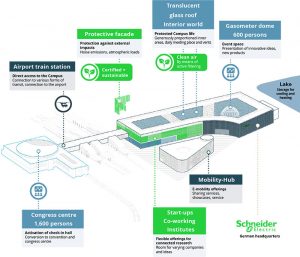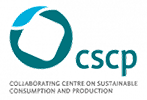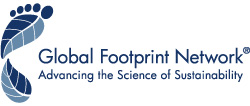Since its development began in 2008, the 5,5-hectare urban quarter of EUREF-Campus Berlin has become a symbol of the energy revolution in Germany. It serves as a home base for companies working in the fields of energy, sustainability and mobility.
A unique European centre for innovative futuristic projects, it met the German government’s climate objectives for 2050 by 2014: the energy supplied to EUREF-Campus Berlin is CO2-neutral thanks to wind, solar, and biomethane combustion, with energy efficiency optimized thanks to the Micro Smart Grid installed and operated by Schneider Electric.
 Inspired by Campus Berlin, the new EUREF development is under way near Düsseldorf airport. The construction of two buildings with 40,000 m2 of total rentable space is planned. One of them will be the green innovation campus, with open courtyards covered by a translucent solar glass roof.
Inspired by Campus Berlin, the new EUREF development is under way near Düsseldorf airport. The construction of two buildings with 40,000 m2 of total rentable space is planned. One of them will be the green innovation campus, with open courtyards covered by a translucent solar glass roof.
In the second new building, a Mobility-Hub will be set up as a testing and founding platform for the mobility of the future: e-mobility, sharing models for e-cars, e-bikes, e-scooters and autonomous driving can be developed and tested.
In addition to hosting Schneider Electric’s Germany headquarters, the new campus is slated to attract innovative start-ups and companies in the energy, mobility and environmental protection sectors.
As in Berlin, the aim is to supply CO2-neutral power to EUREF-Campus Düsseldorf. Thanks to a highly technologized energy hub and the combined use of solar energy, regenerative energies and state-of-the-art storage technologies, the CO2 climate protection targets for 2050 are achieved even before commissioning – and at the same price as conventionally generated energy. Bioreactors with algae growing inside will be installed on the facades for energy production (algae consumes CO2 and produces oxygen and heat.) The back-up will be a combined heat and power plant running solely on biomethane. Renewable energies will be stored using power-to-heat and power-to-cold.
EUREF-Campus Düsseldorf will be integrated in a network of environmentally-compatible energy generators and storage providers in the region.
Facts and Data
- 2 000 tons of CO2 are being saved per year at EUREF Campus Berlin, which equals the amount of CO2 sequestered by a forest the size of about 350 soccer fields
- An electric vehicle could drive around the world 8 times per year using only the power generated onsite
- The green energy generated on the EUREF-Campus over 1 year could power the city of Berlin for 1 hour




